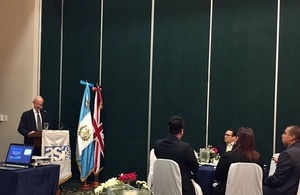UK funded study recommends improved trade facilitation and action against contraband as a way to improve the State’s finances
The Association for Investigation and Social Studies (ASIES), a Guatemalan think-tank, presented a study entitled “Strengthening fiscal revenues, customs transparency and reducing illicit international trade.”

Presenting project on contraband
The report contains a new estimate of the value of illicit trade and customs fraud in Guatemala, and recommends proposals to update the current legal framework. This would allow the Guatemalan State to have improved tools to tackle contraband, minimize corruption and increase fiscal revenues from international trade.
The study was developed with the support of the British Government and its international prosperity programme.
Illicit trade – as a product of contraband and customs fraud - is a criminal activity that undermines the State’s ability to provide basic services in Guatemala. It also corrupts individuals and subverts different branches of the Government.
According to the study, illicit trade in Guatemala was worth US$2.3 billion (nearly 3.5% of the Gross Domestic Product - GDP) in 2015. This figure is a slight increase over 2014. The study estimates that around half of that can be attributed to customs fraud, with the remainder due to the fiscal impact of direct contraband activities.
Erick Coyoy, the expert from ASIES in charge of the investigation said:
This means that the fiscal authority could be collecting an additional US$1.2 billion for the Government’s coffers if customs fraud is eliminated.
Another finding of the investigation highlights that there is an increasing gap between registered imports and exports between 2011 to 2015, suggesting that more illicit trade has been taking place, either through contraband or customs fraud.
Guatemala faces a structural challenge to put in place actions and sanctions that are not at the discretion of customs officials. Instead, the study proposes the implementation of automated systems capable of recording every single transaction.
The magnitude of the customs fraud unveiled by the Public’s Prosecutor Office and the International Commission Against Impunity in Guatemala (CICIG) last year in the “La Linea” case, revealed that illegal groups have been undermining the country’s fiscal revenues for many years.
Amongst other recommendations, the study advises that the fiscal authority (SAT) should audit international trade figures and their associated tax collection. It also recommends including measurable indicators as a way to follow up and evaluate results.
The document highlights that collection goals are important, but that these should be analysed and studied in order to provide consistency in the figures. It is also important that the fiscal authority simultaneously puts in place practices that will facilitate trade and not to take retrograde steps that could discourage entrepreneurship.
Finally, the study encourages the Executive to work with Congress to renew the existing legislation against fraud and contraband at customs.
To mark the United Kingdom’s support to the project, the British Ambassador to Guatemala, Thomas Carter, said:
The results of this study are revealing and show that the Guatemalan authorities are taking steps in the right direction. The United Kingdom will continue supporting Guatemala to improve its fiscal revenues, for example through our funding of the Behavioural Insights Team who are working with the SAT to improve rates of tax collection in Guatemala. Improved rates of tax collection are essential to permit the Guatemalan authorities to improve its provision of basic services in the country.